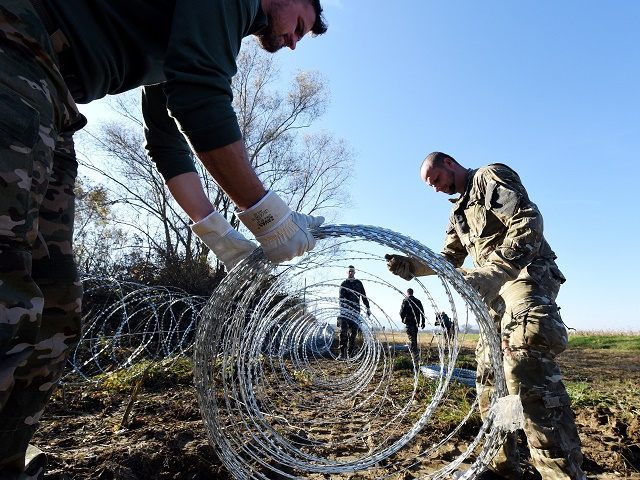TOMPA, Hungary (AP) — A year after the European Union struck a deal with Turkey to stem the flow of migrants into Europe, asylum-seekers are still finding their way into Hungary – and the country’s populist government is doubling down protection of its border with Serbia with a new fence and controversial asylum rules.
Hungary first built anti-migrant fences on its borders with Serbia and Croatia in late 2015 – at the height of the migrant flow on the Balkan route, when sometimes thousands of people passed through Hungary each day on their way to Germany and other destinations in Western Europe.
While the country has since seen a significant reduction in the influx, Prime Minister Viktor Orban insists that the new security measures are justified because Turkey has threatened to terminate the migrant deal, and large numbers of migrants may soon head toward Hungary again.
A new, second fence to be loaded with surveillance equipment running along the Serbian border is almost complete at Tompa, a southern town of 4,400 residents where every corner bears a reminder of where you are: the Border Inn, the Border Food Store and the Green Border Pub.
Local resident Laszlo Tatar says the fence hasn’t stopped the occasional migrant passing through the nearby forests after dark.
“Through the wires or by cutting the wires, I don’t know, but they keep coming,” Tatar said. “Poor people, they just want to go to Budapest.”
Authorities are also expanding a container camp on Tompa’s outskirts, where a handful of asylum-seekers a day are allowed to file their asylum claims. A new Hungarian law ordering the detention of all asylum-seekers in one of two camps – the other is in Roszke, 50 kilometers (31 miles) to the east – has prompted stern criticism from United Nations agencies and human rights advocates, which accuse Hungary of gradually dismantling refugee protection.
Orban insists that stopping the flow of mostly Muslim migrants into Europe is the only way to increase security and preserve the continent’s Christian culture and identity.
“The aim of the law is to put a full stop to illegal migration, close the Balkan route, lower the security risk and protect Europe’s borders,” the government said about the new asylum rules coming into effect next Tuesday. “The tightening is particularly needed as Turkey is threatening to terminate the Turkey-EU deal, which means a new flood of migrants could set off toward the European and Hungarian border.”
In the March 2016 agreement between the EU and Turkey, Ankara agreed to take back migrants crossing illegally into Europe in return for 3 billion euros ($3.2 billion) in aid by the end of 2017 and a promise for visa-free travel within much of the EU for Turkish citizens. Turkish President Recep Tayyip Erdogan last week threatened to scrap the deal over the reluctance of some EU members to allow Turkish ministers to hold campaign rallies in their countries.
Over the past months, far fewer migrants seem to be getting past Hungarian authorities, partly because of intensive police and army border patrols and the summary expulsion back to Serbia of most migrants found in Hungary without proper documents.
Between March 17 and 19, border patrols prevented 13 border crossings and sent 19 migrants back to Serbia. So far this year, 1,147 asylum applications have been filed, compared to over 5,500 in the same period last year.
“This will be a fence that will be able to block the path of even the largest crowds arriving from Turkey,” Orban said on Hungarian state radio. “So in Austria and Germany people can sleep soundly, because Hungarians will be protecting Europe’s external borders.”
Across from Tompa on the Serbian side of the border, farmhand Jozef Pataky used a wheelbarrow to gather a mattress, a sleeping bag and other items left behind on a rye field by migrants who had reached the border fence and likely failed to get across.
“Earlier there were times when they used to come in groups of 30 or 40,” said Pataky, 62. “Since the fence was built, they reach the fence and go back.”
Pataky, an ethnic Hungarian who watches over farm plots in the town of Kelebija, said that he had packed his wheelbarrow four times over the weekend with the migrants’ abandoned possessions.
“I have to clean up before the owner gets here,

COMMENTS
Please let us know if you're having issues with commenting.